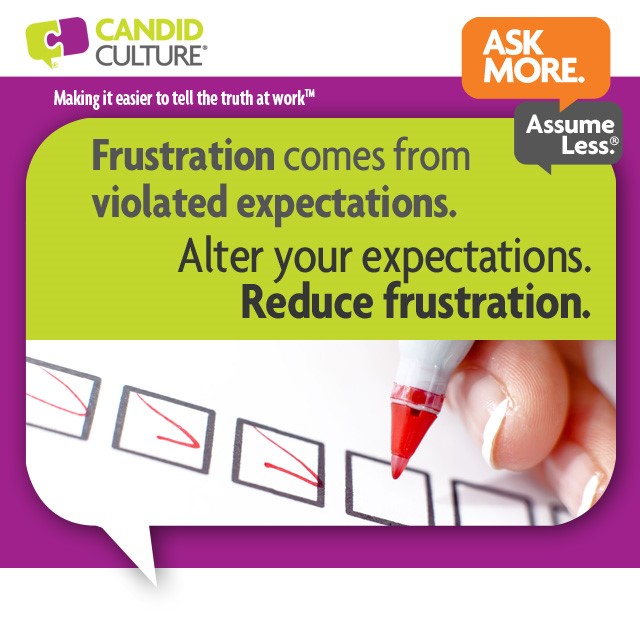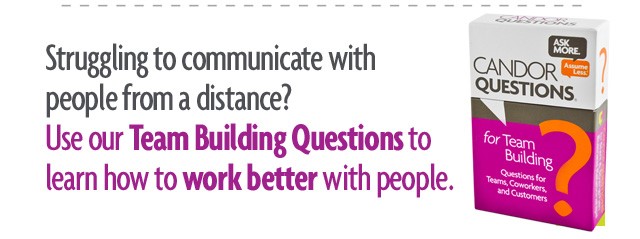Change Your Expectations for Better Working Relationships
The days I’ve struggled to be with my young son during this stay-at-home period are the days his behavior is other than I expect. Jumping, running, and racing around at bedtime when I expect it to be a calm, quiet time. Eating ice cream sandwiches before breakfast when I had already said no. Continuing to play during clean-up time when we had agreed to clean up toys together.
Working with our coworkers, managers, employees, and customers is not different. “I tell people if I’m going to be late or not attend a meeting. Why can’t other people do that?” “I touch base with my employees weekly to see what they need. Why can’t my boss do that?” “I tell vendors if I don’t want to do business with them. Why can’t potential customers just tell me if they don’t want to work with us?”
All of these frustrations stem from violated expectations. I expected you to do x. You did y. That’s – irritating, infuriating, flabbergasting.
To be less frustrated and enjoy working with others more, change your expectations.

I know bedtime is going to be wild, so I need to budget more time to allow for running and jumping before we settle into our bedtime routine. Or better yet, I need to accept that running and jumping are part of our bedtime routine. If someone has a history of not responding to emails or phone calls, I give them more lead time knowing I won’t hear back for a week. I work with the person instead of against them.
It’s easy to think that changing expectations is the same as lowering expectations. It really isn’t. It’s altering the way we work with people to reduce struggle. It’s working with versus working against. Altering expectations is challenging. It takes a lot of patience and preparation.
Below are four ways to change your expectations with people who don’t do things as you think they should:
Remind yourself how this person engages, based on your past experiences with the person. Not to be cynical, but your coworker will likely do something today the same way she did it last week. Remembering how people typically work will help you set your expectations accordingly and you’re likely to be less frustrated when she takes a week to reply to an email.
Set clear expectations when you begin working with people. “I need to get back to my client with this information by Wednesday. I know that’s a quick turn-around. If I don’t hear back from you tomorrow, what’s the best way to get in touch with you?”
I need to tell my son that if he eats sweets when he isn’t supposed to, I won’t buy any more. When it’s clean-up time, any toy my son doesn’t help put away goes into storage for a while.
Follow through on the expectations you’ve set. If you told your coworker you’re going to call and text when you haven’t heard back from them, you need to do that. If the agreement is to escalate when something isn’t done or that you do it yourself and that person isn’t able to provide input, you need to do that.
Following through on expectations is tricky. No one wants to be the ‘’bad or mean” person who holds others to account. And sometimes holding people to established expectations results in anger and backlash.
I’ll never forget the first time I taught at the graduate level at a local university. I set the expectation that I would deduct 10% from assignments that were turned in late. When I followed through on that expectation my students were irate and complained to the Dean, telling her I was unfair.
It was hard to reduce students’ grades. But if I didn’t follow through when expectations were violated, there was no point in setting expectations. It only undermines me and makes me seem like a person who doesn’t mean what she says.
Lastly, be real with people, not harsh or stringent, but real. If you’re struggling to work with someone or struggling to follow through on expectations, tell people that.
“I really need to get this information by Friday, and I don’t know what to do. I’m feeling stuck.”
“I want us to have a good working relationship, but I see that we’re struggling. Can we talk about it?” “I’m realizing I need more contact with you. How can we find 15-minutes a week to connect live?”
No communication techniques supersede being authentic and courageous. When you don’t know what to do or say, just be real. “I’m realizing this isn’t working but I don’t know what to do. I don’t want to go around you. What do you think we should do?” Working with other people and being a powerful communicator takes courage.
People aren’t us. They won’t do things our way. To be less frustrated, alter your expectations. Be ready for others to do things their way and plan for that. And when you can, set clear expectations with everyone involved in how projects and work will be managed. And it’s ok to get upset and express frustration. Be real, be yourself, and plan ahead.



